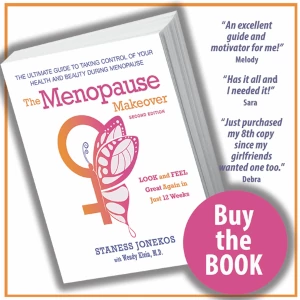 Are you suffering from hopelessness, apprehension, and deep sadness for prolonged periods? If so, you may be suffering from depression. During my menopause transition I felt blue for no reason at all. I could not snap out of it, and my friends and family were mystified.
Are you suffering from hopelessness, apprehension, and deep sadness for prolonged periods? If so, you may be suffering from depression. During my menopause transition I felt blue for no reason at all. I could not snap out of it, and my friends and family were mystified.
Most perimenopausal women do not experience major depression, but many have symptoms of feeling depressed, stressed, and anxious.
If you are experiencing menopausal symptoms such as severe hot flashes and lack of sleep from night sweats, it may be causing you to feel depressed. Are you in a depressed mood and feeling sad, or are you suffering from clinical depression resulting from a chemical imbalance in the brain?
I recently teamed up with leading menopause expert and co-author of The Menopause Makeover, Dr. Wendy Klein, to get the latest scientific information on perimenopausal depression.
Perimenopause Depression Interview
Staness: What are the most common signs of depression?
Dr. Klein: The most common signs of depression are feeling sad, feeling worthless and losing interest in the things that normally engage you. Having no “get up and go,” you would rather sit on the couch doing nothing than get up and do something that would normally engage you. Other symptoms include the loss of libido, changes in appetite – too much or too little – feeling very sleepy and tired and fatigued, or having insomnia, not being able to sleep. A common sign of depression is a change in your normal habits.
A more serious symptom of depression is sustained loss of interest in things that you just can’t seem to break out of, which is called dysthymia. Things seem really bleak and you just can’t quite punch your way out of this paper bag of darkness and it lingers. If it lingers or if you have thoughts that are scary, such as wanting to give up or wanting to hurt yourself or even suicidal thoughts, you must talk to your clinician because there are things that can be done to help you.
Staness: What can cause these feelings of depression during menopause?
Dr. Klein: Depression is multi-factorial. There are many factors that can cause an increased risk for depression. If you have depression in your family, a prior history of depression, and even some medications can cause an increased risk of depression. Certain endocrine disorders, such as hypothyroidism, or other illnesses, such as chronic fatigue syndrome, are also associated with depression.
Depression is an illness that can be triggered by the chemicals in your brain. Serotonin regulates your moods. It is the “feel good” hormone. When serotonin levels drop you can experience extreme episodes of depression.
You also want to look at lifestyle stressors – a change in relationship, finances, loss of a loved one, caring for parents – and consider the many modalities of treatment that are available to help you.
You approach depression in menopause the same way that you would approach depression at any other time: you first want to rule out other medical causes, or other medications that might be contributing.
Staness: Many women live with daily stress and then throw in menopause and a few medications, and it is no surprise menopausal women may suffer from depression. What depression treatment options are available?
Dr. Klein: A number of options are available, including psychotherapy, and antidepressants and can assist you if you are suffering from depression.
There are degrees of depression. Mild depression, feeling blue or sad, can be dealt with cognitive therapy, psychotherapy, meditation, yoga, eating healthfully, and exercise. We know that exercise does boost your endorphins and can lift your mood. Also, engaging in new activities may help, such as making yourself take classes, making yourself get out and do things, and enlisting the support of your family and friends.
If you have lingering or worsening symptoms, you may need medication, because we know that depression can be a malfunction of your neurotransmitters, particularly serotonin, which is the feel good neurotransmitter. Medicines can be enormously helpful, although you will want to incorporate lifestyle changes as well.
In short, if someone is experiencing the signs or symptoms of depression, there are number of things you can do. Eating healthfully, exercising regularly, and seeking support from family and friends may help. Also, you can engage in any activity that gives you a sense of achievement. It may be taking a class, taking up something new such as yoga, or trying the drawing class that you always wanted to take, or volunteering and getting outside yourself. All of these things are very useful.
If you are still feeling very stuck and sad, talk to your clinician so you can get a referral to a good psychotherapist. If you need medication, in the broader context of menopausal symptoms, there is some evidence that hormone therapy can augment treatment and help people who are on anti-depressants feel even better. That is a decision for you and your clinician.
_________
If you suffer from depression or someone you love is depressed, get support, visit your health care provider and discuss your options for treating depression.
















